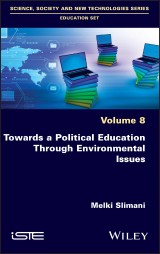Details

Towards a Political Education Through Environmental Issues
1. Aufl.
|
139,99 € |
|
| Verlag: | Wiley |
| Format: | |
| Veröffentl.: | 22.04.2021 |
| ISBN/EAN: | 9781119824008 |
| Sprache: | englisch |
| Anzahl Seiten: | 224 |
DRM-geschütztes eBook, Sie benötigen z.B. Adobe Digital Editions und eine Adobe ID zum Lesen.
Beschreibungen
The growing field of political education through environmental issues is organized around processes, which reach beyond the formal ones found in academic disciplines and national curricula into informal processes (such as social mobilization) and nonformal processes (such as those found in various international educational recommendations). <p>Using theoretical approaches from the fields of political philosophy and the social sciences, this book develops a simultaneously conceptual and analytical framework for the political in educational content involving environmental issues. This framework is then used to empirically analyze educational content on sustainable development formulated by UNESCO, as well as the Tunisian curriculum. <p>The theoretical and empirical studies carried out in this book lead to proposed curriculum tags for political education through environmental issues, with the intent of opening this field to inclusion in the didactics of curriculum research.
<p>Foreword ix</p> <p>Introduction xiii</p> <p><b>Chapter 1. The Political Trend in Environmental Issues </b><b>1</b></p> <p>1.1. Politics, the political and depoliticization 1</p> <p>1.2. The political and the anti-political 2</p> <p>1.3. Environmental and development issues (EDIs) between the political and anti-political or politics and depoliticization: what are the trends? 3</p> <p>1.3.1. Issues of environmental politics and environmental change 3</p> <p>1.3.2. Environmental ethical issues 6</p> <p>1.3.3. Sustainable development issues 8</p> <p>1.3.4. Agrifood issues 9</p> <p>1.3.5. Issues concerning environmental technology and environmental management 11</p> <p>1.3.6. Issues of transitioning to sustainability 13</p> <p>1.4. Conclusion 17</p> <p><b>Chapter 2. The Political Potential of Environmental Issues </b><b>19</b></p> <p>2.1. The regulatory categories of political life 19</p> <p>2.1.1. Political philosophy approaches 19</p> <p>2.1.2. Political science approaches 21</p> <p>2.1.3. Educational approaches 22</p> <p>2.2. The regulatory categories of political life in situations involving environmental and development issues 24</p> <p>2.2.1. Environmental literacy 24</p> <p>2.2.2. Ecological citizenship 26</p> <p>2.2.3. Environmental deliberation 31</p> <p>2.2.4. Environmental collective action 35</p> <p>2.3. Conclusion 37</p> <p><b>Chapter 3. Political Learning and Socialization in Teaching Environmental Issues </b><b>39</b></p> <p>3.1. Educational purposes and projects: sociological, pedagogical and didactic approaches 39</p> <p>3.1.1. Educational purposes and social functions of school: the sociological approach 39</p> <p>3.1.2. Educational purposes and regulation of the teaching and learning process: the pedagogy of learning approach 40</p> <p>3.1.3. Educational purposes and effectiveness of teaching and learning: the curricular didactic approach 41</p> <p>3.1.4. Educational purposes of socialization 41</p> <p>3.2. Evolution of the contributions of didactic research for the educational purposes of socialization 44</p> <p>3.2.1. Sciences education and disciplinary cognitive socialization 44</p> <p>3.2.2. Education for scientific uncertainty and critical cognitive socialization 45</p> <p>3.2.3. Eco-citizenship education and political socialization 46</p> <p>3.2.4. Education for sustainable development (ESD) and democratic socialization 46</p> <p>3.3. Teaching of environmental and development issues and political learning: integrating socialization purposes 47</p> <p>3.3.1. Ecoliteracy learning 49</p> <p>3.3.2. Deliberative learning 51</p> <p>3.3.3. Learning through social roles in a community of eco-citizens and political socialization 53</p> <p>3.3.4. Learning in collective educational action regimes 55</p> <p>3.4. Conclusion 57</p> <p><b>Chapter 4. Methodological Considerations </b><b>59</b></p> <p>4.1. Case study methodology 59</p> <p>4.2. Selection of case studies 60</p> <p>4.2.1. UNESCO’s “Education for Sustainable Development Goals”: a prototype case in non-formal education 60</p> <p>4.2.2. EDIs in the Tunisian curriculum: a representative case in formal education 61</p> <p>4.3. Defining the analytical criteria 63</p> <p>4.3.1. Criteria of the documentary analysis for selecting EDIs in prescribed curricula in Tunisia 63</p> <p>4.3.2. Criteria for analyzing the political trend 64</p> <p>4.3.3. Criteria for analyzing the political potential of EDIs 65</p> <p>4.3.4. Criteria for the analysis of potentialities for socialization in terms of political learning 67</p> <p>4.4. Procedure for data collection and analysis 69</p> <p>4.4.1. Thematic content analysis 70</p> <p>4.4.2. Direct observation 74</p> <p>4.4.3. Interviews 76</p> <p>4.5. Defining the research quality criteria 77</p> <p>4.5.1. Strategies for increasing internal validity 78</p> <p>4.5.2. Techniques to ensure reliability 79</p> <p><b>Chapter 5. The Political within “Education for Sustainable Development Goals” </b><b>81</b></p> <p>5.1. Analysis of the Sustainable Development Goals (SDGs) 2030 81</p> <p>5.1.1. The political/anti-political trend 81</p> <p>5.1.2. Political potential 83</p> <p>5.1.3. Conclusion 85</p> <p>5.2. Analysis of the content of “Education for SDGs” 86</p> <p>5.2.1. The political/anti-political trend 86</p> <p>5.2.2. Political potential 88</p> <p>5.2.3. The potentialities for socialization in terms of political learning 89</p> <p>5.2.4. Conclusion 91</p> <p><b>Chapter 6. The Political within the Tunisian Curriculum </b><b>93</b></p> <p>6.1. Secondary school curriculum analysis 93</p> <p>6.1.1. The prescribed curriculum 93</p> <p>6.1.2. Potential curriculum 97</p> <p>6.1.3. The produced curriculum 100</p> <p>6.2. Analysis of the undergraduate curriculum: the bachelor’s degree in environmental protection 104</p> <p>6.2.1. Prescribed curriculum 104</p> <p>6.2.2. The produced curriculum 111</p> <p>Conclusion 117</p> <p><b>Appendices 129</b></p> <p>Appendix 1. Interviews: Guides and Help Lists 131</p> <p>Appendix 2. Report on Political Elements in the SDG 2030 Agenda and in the Contents of “Education for 2030 SDGs” 137</p> <p>Appendix 3. Report on political elements in the Tunisian Curriculum 147</p> <p>Glossary 177</p> <p>References 183</p> <p>Index 199</p>
<p><b>Melki Slimani</b> holds a PhD in Education Sciences from the University of Montpellier, France, and the University of Tunis, Tunisia. He teaches Educational Sciences at the Higher Institute of Applied Studies in Humanities (ISEAH) Sbeitla, University of Kairouan, Tunisia.
Diese Produkte könnten Sie auch interessieren:

The Vicuña

von: Iain Gordon, Jane C. Wheeler, Hugo Yacobaccio, Jerry Laker, Marcelo Cassini, Mariela Borgnia, Yanina Arzamendia, Verónica Benítez, Bibiana Vilá, Cristian Bonacic, Jessica Gimpel, Pete Goddard, Desmond McNeill, Gabriela Lichtenstein, Renaudeau d' Arc Nadine, Kristi Anne Stølen, Javier García Gomez, Ana Wawrzyk

96,29 €

Saving Biological Diversity

von: Robert A. Askins, Glenn D. Dreyer, Gerald R. Visgilio, Diana M. Whitelaw

96,29 €

Martens and Fishers (Martes) in Human-Altered Environments

von: Daniel J. Harrison, Angela K. Fuller, Gilbert Proulx

149,79 €













